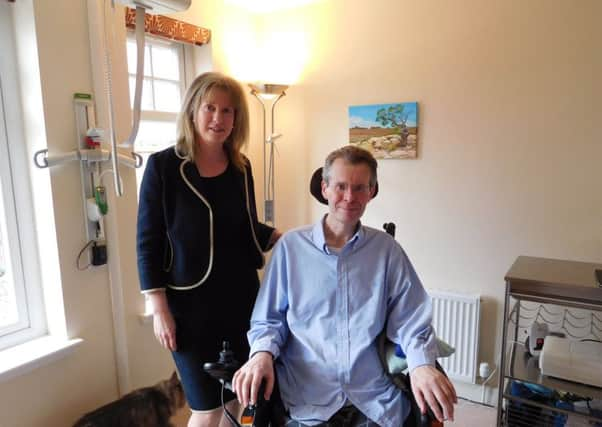Calum Ferguson: MND sufferers should live with dignity


I was diagnosed with MND in March 2010. As a 46-year-old with three young children this was a devastating piece of news, particularly given the poor prognosis. However, I decided from the outset that I was not going to give in easily,
I kept working for two years and we had some memorable family holidays. I became wheelchair-bound in March 2012 and seriously ill during the autumn of 2012. I appeared to be in the typical end of life spiral of MND and after a period in Intensive Care in Edinburgh during November 2012,
Advertisement
Hide AdAdvertisement
Hide AdI was transferred to my local hospice in December 2012. By this time I was ventilated, had a feeding tube fitted and I was not expected to live for more than six weeks.
At this point Stirling Council and NHS Scotland came together to ensure I was able to come home to die. A care package was put into place and after spending what we all thought was my last Christmas in the hospice, I came home on 27 December 2012.
Amazingly, due to the combination of good care, equipment and physiotherapy my condition has since pretty much stabilised. Now I have limited mobility but I am still able to talk normally and eat a good, albeit modified diet.
I can use the computer via Eyegaze, which enables me to control my computer with my eyes - this gives me access to the internet and the ability to type.
However, there are many MND sufferers out there who due to the postcode lottery have limited access to much of this care and equipment, something that needs to change, and soon. Most of us don’t have long - average life expectancy after diagnosis is two years.
We need to ensure that MND patients have the right to live and to die with dignity.
In the early days following diagnosis most sufferers are primarily cared for by family members, however, as sufferers symptoms progress external care becomes essential.
The integration of Social Care into NHS Scotland should improve significantly the availability of care to MND patients across Scotland.
Advertisement
Hide AdAdvertisement
Hide AdNHS Scotland should be considering adopting the new NICE MND Guidance for England & Wales.
With the adoption of these NICE Guidelines together with the combined resources of NHS Scotland, MND Scotland and The Euan McDonald Centre, Scotland should be aspiring to show the rest of the world what can be achieved in the management of MND, as well as playing our part in the search for a cure.
•Calum Ferguson is a MND campaigner. to support him please visit: https://www.justgiving.com/Calum-Ferguson1/ or through JustTextGiving by texting CALC51 £10 to 70070.